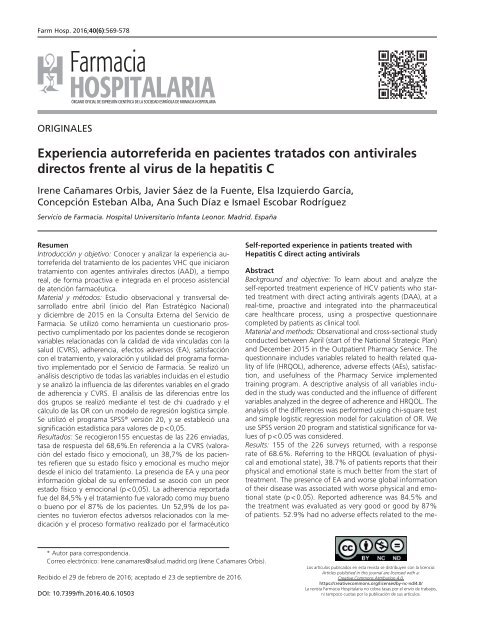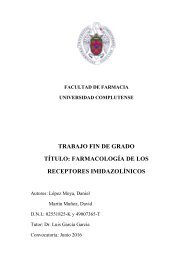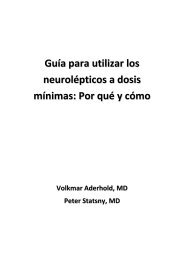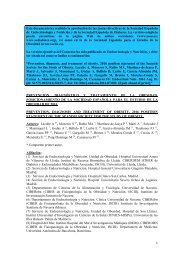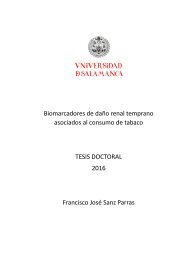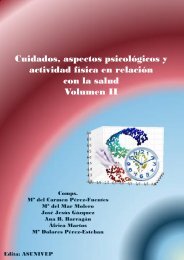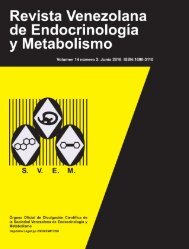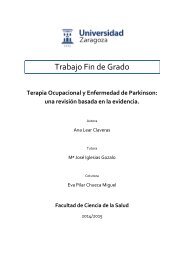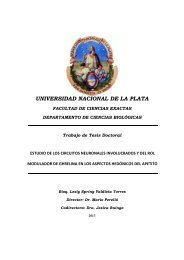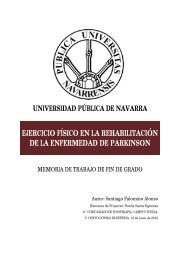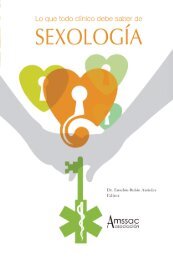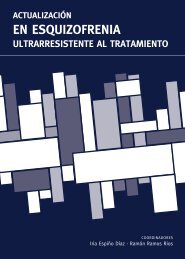Noviembre-Diciembre
156_v40n6(1)
156_v40n6(1)
You also want an ePaper? Increase the reach of your titles
YUMPU automatically turns print PDFs into web optimized ePapers that Google loves.
Farm Hosp. 2016;40(6):569-578<br />
ORIGINALES<br />
Experiencia autorreferida en pacientes tratados con antivirales<br />
directos frente al virus de la hepatitis C<br />
Irene Cañamares Orbis, Javier Sáez de la Fuente, Elsa Izquierdo García,<br />
Concepción Esteban Alba, Ana Such Díaz e Ismael Escobar Rodríguez<br />
Servicio de Farmacia. Hospital Universitario Infanta Leonor. Madrid. España<br />
Resumen<br />
Introducción y objetivo: Conocer y analizar la experiencia autorreferida<br />
del tratamiento de los pacientes VHC que iniciaron<br />
tratamiento con agentes antivirales directos (AAD), a tiempo<br />
real, de forma proactiva e integrada en el proceso asistencial<br />
de atención farmacéutica.<br />
Material y métodos: Estudio observacional y transversal desarrollado<br />
entre abril (inicio del Plan Estratégico Nacional)<br />
y diciembre de 2015 en la Consulta Externa del Servicio de<br />
Farmacia. Se utilizó como herramienta un cuestionario prospectivo<br />
cumplimentado por los pacientes donde se recogieron<br />
variables relacionadas con la calidad de vida vinculadas con la<br />
salud (CVRS), adherencia, efectos adversos (EA), satisfacción<br />
con el tratamiento, y valoración y utilidad del programa formativo<br />
implementado por el Servicio de Farmacia. Se realizó un<br />
análisis descriptivo de todas las variables incluidas en el estudio<br />
y se analizó la influencia de las diferentes variables en el grado<br />
de adherencia y CVRS. El análisis de las diferencias entre los<br />
dos grupos se realizó mediante el test de chi cuadrado y el<br />
cálculo de las OR con un modelo de regresión logística simple.<br />
Se utilizó el programa SPSS ® versión 20, y se estableció una<br />
significación estadística para valores de p < 0,05.<br />
Resultados: Se recogieron155 encuestas de las 226 enviadas,<br />
tasa de respuesta del 68,6%.En referencia a la CVRS (valoración<br />
del estado físico y emocional), un 38,7% de los pacientes<br />
refieren que su estado físico y emocional es mucho mejor<br />
desde el inicio del tratamiento. La presencia de EA y una peor<br />
información global de su enfermedad se asoció con un peor<br />
estado físico y emocional (p < 0,05). La adherencia reportada<br />
fue del 84,5% y el tratamiento fue valorado como muy bueno<br />
o bueno por el 87% de los pacientes. Un 52,9% de los pacientes<br />
no tuvieron efectos adversos relacionados con la medicación<br />
y el proceso formativo realizado por el farmacéutico<br />
Self-reported experience in patients treated with<br />
Hepatitis C direct acting antivirals<br />
Abstract<br />
Background and objective: To learn about and analyze the<br />
self-reported treatment experience of HCV patients who started<br />
treatment with direct acting antivirals agents (DAA), at a<br />
real-time, proactive and integrated into the pharmaceutical<br />
care healthcare process, using a prospective questionnaire<br />
completed by patients as clinical tool.<br />
Material and methods: Observational and cross-sectional study<br />
conducted between April (start of the National Strategic Plan)<br />
and December 2015 in the Outpatient Pharmacy Service. The<br />
questionnaire includes variables related to health related quality<br />
of life (HRQOL), adherence, adverse effects (AEs), satisfaction,<br />
and usefulness of the Pharmacy Service implemented<br />
training program. A descriptive analysis of all variables included<br />
in the study was conducted and the influence of different<br />
variables analyzed in the degree of adherence and HRQOL. The<br />
analysis of the differences was performed using chi-square test<br />
and simple logistic regression model for calculation of OR. We<br />
use SPSS version 20 program and statistical significance for values<br />
of p < 0.05 was considered.<br />
Results: 155 of the 226 surveys returned, with a response<br />
rate of 68.6%. Referring to the HRQOL (evaluation of physical<br />
and emotional state), 38.7% of patients reports that their<br />
physical and emotional state is much better from the start of<br />
treatment. The presence of EA and worse global information<br />
of their disease was associated with worse physical and emotional<br />
state (p < 0.05). Reported adherence was 84.5% and<br />
the treatment was evaluated as very good or good by 87%<br />
of patients. 52.9% had no adverse effects related to the me-<br />
* Autor para correspondencia.<br />
Correo electrónico: Irene.canamares@salud.madrid.org (Irene Cañamares Orbis).<br />
Recibido el 29 de febrero de 2016; aceptado el 23 de septiembre de 2016.<br />
DOI: 10.7399/fh.2016.40.6.10503<br />
Los artículos publicados en esta revista se distribuyen con la licencia:<br />
Articles published in this journal are licensed with a:<br />
Creative Commons Attribution 4.0.<br />
https://creativecommons.org/licenses/by-nc-nd/4.0/<br />
La revista Farmacia Hospitalaria no cobra tasas por el envío de trabajos,<br />
ni tampoco cuotas por la publicación de sus artículos.


